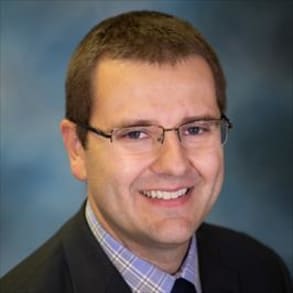Meet Dr. Alan Johnson, as he discusses his areas of focus, his path to medicine, the care of his patients, how the field of Electrophysiology is evolving.
Hello, my name is Alan Johnson. I'm one of the cardiac electrophysiologists here at R MH. I specialize in heart rhythm and heart rhythm disorders, heart rhythm disorders, encompass a bunch of different things, including pacemakers, defibrillators, atrial fibrillation, basically, any fast or slow heart rhythm and all the reasons for it are covered by E P or electrophysiology. I came to medicine through uh my grandfather, he was a, a family physician in a small town and I wanted to get back to kind of some small town roots, but I found that I really liked the um highly specialized field of electrophysiology. And so I kind of found a nice marriage of that here in Harrisonburg. It's in her arm age in terms of uh patient care. I, I kind of sit with the patient at the forefront. And um my goal is to bring my knowledge and my understanding of different uh diseases and, and problem states to the patient and, and really kind of partner with them in to, in terms of making that decision of, of where we go from there. I'm not gonna tell you what to do. I'd rather tell you what I know, and, and then we can decide on what we do together. Um Electrophysiology has been a field that's kind of ever evolving and constantly changing. It's uh really married tightly with a lot of the technology partners and vendors that we have. And so there's always new innovations from the leadless pacemaker, which is a small bullet size pacemaker that goes in the right ventricle to uh the watchman device, which is a um a delusion device to try and prevent strokes. There's some new ablation technology coming out with um P field ablation it a little a little bit further on the horizon than some of these other things. And I think the newest thing right now is really conduction system pacing where we're actually trying to pace the native conduction system of the heart as opposed to, to pacing anywhere in the heart. We're really kind of trying to target a very small area there. And I think that's the newest thing for us here at R M.
Related Presenters
